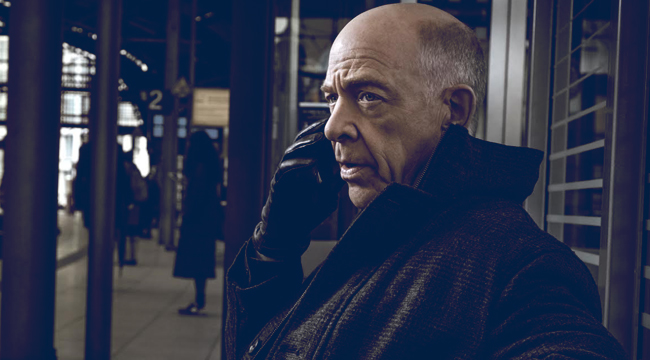
The new Starz drama Counterpart, which debuts Sunday, features a crazy high-concept executed in a fashion that’s at once buttoned-down and wild in its own right. The best way I can describe it is if The Spy Who Came In From the Cold and Fringe had a threesome with The Parent Trap.
JK Simmons stars as Howard Silk — two Howard Silks, actually, since the core idea involves a parallel reality that split off from our own a few decades ago. As one of them explains, “There was one reality, and then it duplicated,” leading to changes both global and personal. The Howard from the world we know is a polite and friendly office drone in the agency that manages the border between the two Earths, so low-level he doesn’t even understand what he or the agency does; the Howard from this slightly off-kilter, depopulated alternate Earth is a ruthless spy who can’t believe how soft and meek the man wearing his face has become.
“He looks exactly like me, but he is nothing like me,” complains our Howard after meeting his doppelganger.
Spy Howard has come to our earth to stop an assassin called Baldwin (Sara Serraiocco) and figure out why she was sent here from his reality. Bureaucrat Howard just wants to stay out of trouble and visit his comatose wife Emily (Olivia Williams) in the hospital as she recovers (or doesn’t) from a hit-and-run. But the spy has good reason to mistrust his handlers on both earths (played by, among others, Ulrich Thomsen, Harry Lloyd, and Stephen Rea), forcing him to lean on the nebbishy Howard more than either man would like.
Created by Justin Marks (The Jungle Book), Counterpart takes the chilly form and careful pacing of a Cold War thriller — another spy’s widow, unaware of the parallel realities, asks if her husband was working for America or the Russians — leaning on European locations (both Howards work in Berlin) and a soundtrack heavy on classical music. Even most of the technology is from the ‘80s or earlier, despite it not being a period piece, for reasons that make sense the more we learn about the other reality. But it’s less John Le Carré in sci-fi drag than a character study, digging deep into each Howard — particularly after, as is mandatory for tales of dead ringers, they have to switch places for a while — to figure out how the same start could produce two men with so little in common.
“Difference between you and me could be a single moment,” spy Howard suggests. “One little thing gone wrong.”
Though Simmons’ build has fluctuated over the years(*), and he occasionally wears wigs, he’s not exactly a physical chameleon. But he’s been able to use that open, hangdog face incredibly varied effect over the years, from cruel monsters in Oz and Whiplash (for which he won an Oscar) to the warmest of people in Juno and The Meddler, to all manner of tones in between. That versatility serves him perfectly here, since the story requires the Howards to look alike but seem clearly different, even when one is impersonating the other.
(*) When interviewing him at the end of his time on Oz, I asked for the most important thing he’d learned from his breakthrough role. He told me it was seeing how heavy he was while watching the first season and committing to getting in shape. As anyone who saw his biceps in Whiplash (or this Instagram post from a couple of years ago) can attest, he more than met his goal.
No matter how convoluted the story gets — and it gets plenty, as you might expect from its influences — it works at its core because it can always turn to one Howard or the other, and the process of each man learning more about the roads not taken by his double are even more compelling than whether Baldwin can be stopped, or what the larger conspiracy is. The best scene in the six episodes sent to critics just involves our Howard looking around a room in the other Howard’s apartment and absorbing the biggest difference between them. Simmons’ delivery also can wring laughs out of the driest of lines, which proves an invaluable relief from an approach that’s otherwise intensely sober-minded.
The supporting cast — which also includes Richard Schiff as a diplomat, Nazanin Boniadi as Baldwin’s handler, and Kenneth Choi as Emily’s boss — is strong and deep enough that Counterpart doesn’t become entirely Simmons-dependent. Williams is predictably excellent, and Italian actress Serraiocco is an English language find as Baldwin, whose mission goes pear-shaped in a hurry and has to figure out what to do next.
Without seeing the full season, it’s hard to say whether there’s too much story or not quite enough to fill a 10-episode season. As is often the case with actual Le Carré, I reached a point where I largely lost interest in whatever the plot was about. But just as there are two Howard Silks, there are essentially two Counterparts: the spy drama with science fiction trappings, and the character study with same. Spy Howard often has to carry bureaucrat Howard through the latest crisis, and the character version of Counterpart can more than carry the spy story when it starts to feel too pokey.
Alan Sepinwall may be reached at sepinwall@uproxx.com. He discusses television weekly on the TV Avalanche podcast. His new book, Breaking Bad 101, is on sale now.
